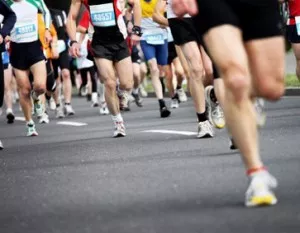
Are you a workout nut? Do you live to sweat, and go to sleep each night dreaming of your next delicious endorphin rush?
Well, good for you!
Now onto the real discussion…
The exercise world is a veritable treasure trove of the physically fit, but the internally unhealthy – people that showcase sleek, muscled bodies that cleverly hide a limping cellular ecology. In fact, I hear it quite frequently these days, and it sounds a little like this:
I can run 10 miles without getting winded! Pullups? No problem! Dead lifts, bicycling, squats, rowing, hiking, swimming, sports? I’m Superman! Hear me roar…
…well, at least until I get home and have to take a handful of painkillers for my migraine. Or toss back a few acid-reflux pills, alongside my nightly sleep prescription and anti-depressant. You know, the usual.
You would assume (or at least, I would) that if someone goes to such great lengths to improve their “physical fitness” that they would follow through in the rest of their lifestyle. However, that doesn’t appear to be the case in a significant portion of those that I’ve encountered. I’m certainly not implying that they are sitting around scarfing fast food and cold pizza like penniless college students, but neither are they knowledgeable on what a truly well-balanced diet entails or what could possibly be causing their chronic (or even periodic) ailments.
Nutrition + Fitness
Living a healthful life will never come down to a choice between diet or activity; it will always be a complimentary amalgamation of the two. People engaging in one without the other is a recipe for failure. Without proper nutrition, your body has no way to power activity, and without that activity your body quietly deteriorates and loses mobility from lack of use.
Strangely enough, mainstream sports “nutrition” seems to have derailed in their education and begun to define nutrition based on what ingredients are simply cheapest for them to incorporate… but don’t worry, they’ll still charge an arm and a leg for the corn syrup solids and petroleum-based dyes they’re selling you.
Which, by the way, if your fitness supplement or beverage contains dyes like the ones I mentioned, I’m going to go out on a limb and say you’re doing it wrong. Nothing good can come from an unnaturally fluorescent blue or green fluid. This isn’t a comic book and you won’t be gaining any super powers – although it’s probably pretty accurate to associate fluorescent green with toxic waste. Those dyes have been linked to a plethora of different neurological issues (not to mention the sugar substitutes some of them use). It boggles the mind that so very many people are willing to grab a sugary, red-dyed “sports drink” after their workout and not even pause to consider the sheer oxymoron in the action.
But I digress…
Overall, athletes experience a greater loss of essential minerals and higher stress on their bodies – profuse sweating, elevated energy consumption, chronic hormone spikes, muscle recovery, etc. As such, their nutrient intake requires a more critical eye and sagacious planning. However, despite the fact that fitness enthusiasts specifically should be more vigilant about well-rounded and impactful nutrition, this certainly doesn’t exclude the remainder of the population from needing to apply these principles as well – no matter how infrequent your exercise or light your activity.
Another aspect of being nutritionally well-rounded is supplementation. An unfortunate reality of our food system in this day and age is plummeting nutritional values. Between dwindling soil quality, environmental pollution, and the over-processing of foods, we’re not exactly working with the same bountiful, nutrient-dense smorgasbord that we were 150 years ago. We can thank our lucky stars that [quality] supplements have given us a sort of fallback plan. I can’t even imagine the type of obsessive eating it would take to attempt to get every necessary vitamin and mineral from food daily… but I know from keeping my ear to the proverbial ground that there are people out there doing exactly that. (My brain is sweating just thinking about it!)
For those of you who focus on neither fitness nor nutrition… I suppose, at the very least, acting on one of these would be better than nothing at all. In this case, if I had to choose between the two, I would say that nutrition is more of a priority.
Magnesium & Athletic Performance


Obviously, since we’re a “magnesium blog”, this essential mineral is bound to be the focus of my post… that is, now that I’ve stepped off of my “nutrition in fitness” soapbox.
Having had the opportunity to research magnesium and its many facets as they pertain to physical fitness, I have to say that I still have a long way to go. That’s not to say that I haven’t learned a great deal – it’s just that this mineral plays such a large role and affects so very many processes that the science of it seems boundless.
In a previous post, I discussed magnesium and its role in the production of ATP – a.k.a. energy. To briefly summarize, magnesium is critical in hundreds of biochemical reactions (some hypothesize that this is actually numbered in the thousands) – without it our cells are incapable of producing energy. Ergo, low magnesium, low energy. It’s also a vital element for muscle function, oxygen uptake, and electrolyte balance.
For those engaging in exercise on a routine basis or active lifestyles, this bumps magnesium to the top of the priority list. Not only is it critical for fueling that above-average exertion, but the likelihood of a deficiency is increased in this population as there is often a struggle to maintain balance between loss and replacement. Research has also shown that physically active females are even more at risk of a magnesium deficiency thanks mostly to hormonal fluctuations (lucky us!).
Having sufficient magnesium levels can mean the difference between feeling energized after a workout or being wiped out and ready to collapse. The cycle of mineral depletion is not something that athletes can ignore – at least not for long, and especially not if their goal is to improve upon performance.
A little interesting fact for competition-level athletes – having low magnesium levels can significantly affect immune function. Studies show that long periods of high-impact training or short bursts of severe exercise can open the body up for a long list of ailments in those who are magnesium deficient. These ailments commonly manifest in the form of respiratory infections, which can be especially debilitating in a heavily aerobic lifestyle. And although regular, mild exercise does in fact help boost the immune system to better guard against illness… low magnesium levels often lead to a domino effect of immunopathological changes and inflammation that ultimately negate those benefits.


Digging into an eclectic assortment of medical journals, I read numerous studies reporting increased stamina and muscle recovery with the simple addition of magnesium supplementation. Others reported various combinations of magnesium and complimentary nutrients (such as B6, D, and selenium) boosting this increased stamina and muscle recovery effect. Although there was a wide range of outcomes, ranging from small increases in endurance to vast improvements over the control groups, the evidence clearly pointed to magnesium being efficacious in boosting athletic performance.
Additionally, due to its integral role in protein synthesis, magnesium has been shown to significantly benefit strength training. That’s right, weight-lifters! Instead of being full speed ahead on the creatine/protein train while disregarding many other nutrients, you need to make sure that magnesium also holds a starring role in your routine. Not only could it improve your overall muscle structure and development, but it might also help you break through that ceiling you’ve been hitting (I’m making assumptions here).
Yet, no matter the growing evidence of its considerable impact on physical health and athletic performance, magnesium has yet to make the unofficial list of supplement staples that fitness enthusiasts and nutritionists alike keep in the forefront of their minds.
—-
There is so very much to be said on the subject of magnesium and fitness, that I’m going to stop right here and save the rest for a future post (or posts).
If you enjoyed this article, keep your eye on our blog and the continuation of this topic with Cortisol, DHEA and Magnesium where I delve into stress levels, hormone balance, fat retention and, of course, magnesium! As always, feel free to leave a comment or send us a message with any questions or feedback!
